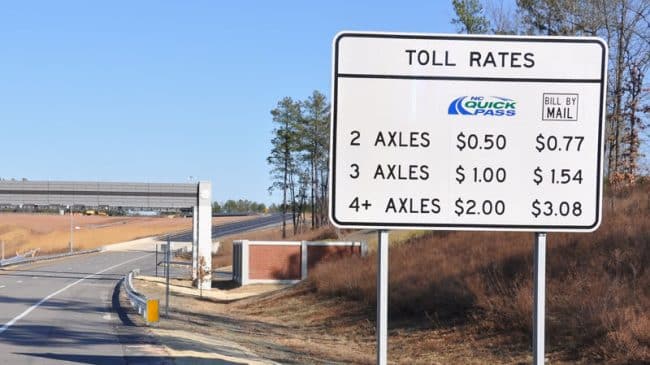Ten years ago Texas was emerging as the promised land for tolling and public-private partnership highway projects. With strong political support, Texas DOT was tapping the private sector to finance, build, and operate both all-new toll roads and express lanes added to congested freeways.
That was then; this is now. Last fall in his successful run for governor, Greg Abbott and running mate Dan Patrick campaigned for increased highway investment, but with no new toll roads. That position had popular support, according to survey results released last September. The Texas A&M Transportation Institute’s Texas Transportation Poll, which found that 64% support increased transportation funding in Texas, also ranked “building more toll roads” as the least desirable of 15 alternative ways of helping “solve transportation issues” in the state. And in the section on funding alternatives to support increased investment, tolling was not even on the list.
In his State of the State speech earlier this month, Gov. Abbott presented his plan to add $4 billion a year to transportation funding “without raising taxes, fees, tolls, or debt.” His three magic bullets are (1) new revenues from the voter-approved tax on oil and gas production (Proposition 1), (2) ending some diversion of state highway funds to other uses (but not the constitutional diversion of 25% of fuel tax money to public education), and (3) enacting a constitutional amendment to dedicate half the existing sales tax on motor vehicles to transportation. Note that only the first of these is already law; the other two depend on legislative action.
Let me hasten to add that all is not lost for tolling in Texas. Projects already under way as toll concessions will go forward. And the local agencies with tolling authority (the legacy toll agencies in Dallas and Houston and the newer Regional Mobility Authorities in other cities) will continue expanding their systems. Indeed, shortly after Gov. Abbott’s speech, county commissioners in Bexar County voted to proceed with three long-planned toll projects in the San Antonio metro area. But if only local toll agencies can initiate toll projects, there may be little or no scope for more P3 concession projects in Texas.
What we are seeing in Texas is part of a disturbing trend to use anything but user-charge revenues to fund highway improvements. Both Pennsylvania and Virginia have “reformed” their transportation funding systems, shifting to a wholesale tax on petroleum providers that is intended to be less visible to retail purchasers than the prior cents/gallon tax at the pump. Governors in North Carolina and Wisconsin have proposed new bond issues to beef up near-term transportation spending. And the hottest idea in Congress for bailing out the Highway Trust Fund is “repatriation” – offering a deal to corporations with huge revenues stashed overseas to bring those funds back home at a much-reduced corporate tax rate, and using the new revenues for a six-year bailout of the Trust Fund.
These trends go in exactly the wrong direction. Instead of watering down the users-pay/users-benefit principle, Congress and state legislatures should be strengthening it. Consider that all the other network utilities that provide us with needed services – cable TV, electricity, natural gas, telecommunications, water, etc. – charge directly for their services, based on what you are using. They all issue long-term revenue bonds to finance major capital improvements, and the decisions on what improvements to make are basically business decisions, not political decisions. That means they have to show a positive return on investment in order to obtain the needed financing. Other major transportation infrastructure – airports, railroads, seaports – also operate this way. It is only in highways that the funding system is so politicized that we are subjected to regular funding crises.
Longer term, the shift away from the user-fee principle will make it that much harder to make the eventual transition from per-gallon taxes to per-mile charges as the basic highway funding source (generally referred to as mileage-based user fees). Increased use of tolling, especially on the limited-access portion of the highway system, is an important step in the larger transition to mileage-based user fees, as recognized by the Transportation Research Board (2006) and the National Surface Transportation Infrastructure Financing Commission (2009).
I can anticipate a rejoinder from some within the P3 concession community saying not to worry; we can still do numerous large-scale projects as availability payment concessions. I readily agree that AP concessions are a big improvement over traditional design-bid-build procurement. But in my view, the future scope for non-toll AP concessions is inherently limited. An AP concession creates a large long-term liability for the state government in question, which under proper accounting rules goes onto the state’s balance sheet and affects the state’s bonded indebtedness limit (as is the case in both Florida and North Carolina). While toll concessions create a large new revenue stream, AP concessions use existing transportation revenues to finance the projects. And it is insufficient revenues that limit needed highway investment.
In short, it looks as if the transportation community has not done a good enough job of educational outreach on tolling and P3 concessions. Populist right-wing groups that equate tolling with taxes and progressive left-wing groups that attack P3s as crony capitalism have influenced elected officials in a number of states, including Colorado, North Carolina, Texas, and Virginia. Their arguments are wrong, but they have not been adequately countered by state DOTs, the P3 industry, and think tanks. In 2015, we all need to devote more time and attention to this. As was often said in the early days of the Reagan White House, “If not us, who? If not now, when?”
Robert Poole is director of transportation at Reason Foundation. This column originally appeared in Public Works Financing.

